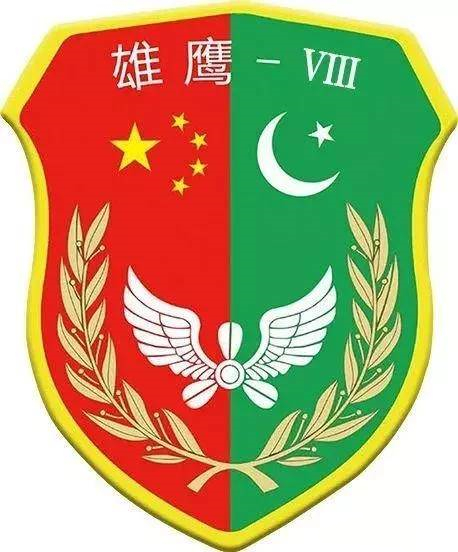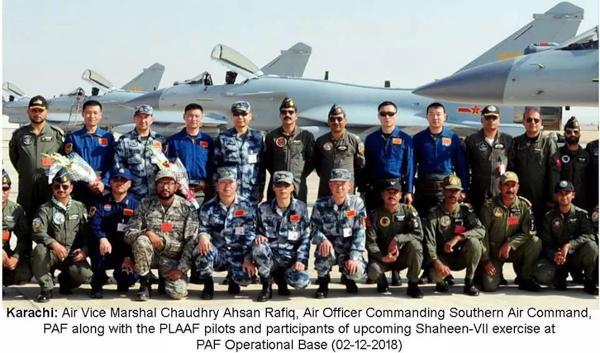
By Zhou Yuting
The Chinese and Pakistani air forces kicked off their joint training code-named “Shaheen (Eagle) VIII”, in a location in northwest China on August 23, which was an annual routine training between the two sides that does not target any third party. What are the new highlights of this year’s drill compared with the previous ones? How will the regular joint training deepen the relations between China and Pakistan, and the two militaries as well? Military observer Senior Colonel Du Wenlong will answer these questions through in-depth analysis.
It is reported that the People’s Liberation Army Air Force dispatched J-10C, J-16 and early warning aircraft as well as ground detachments covering ground-to-air missile, radar, airborne landing and communication to join the training, while Pakistani air force dispatched multiple types of aircraft, including the JF-17 Thunder, Mirage and early warning aircraft. The air arm of the PLA Navy also assigned aircraft to the joint training. Both sides assigned a full range of troops and the quality of the joint training this time will be considerably boosted, according to military observer Senior Colonel Du Wenlong.
Senior Colonel Du Wenlong:
Both China and Pakistan assigned full range of troops including all typical elements. For instance, China dispatched J-10C, J-16 and JH-7 fighter jets, and early warning aircraft, which covered such key elements as air strike and ground attack, constituting a complete air combat system. Plus the ground-based air defense early warning equipment, a full system of elements ranging from ground to air, and from attacking to commanding is exactly in place.
Pakistan dispatched the JF-17 Thunder and Mirage fighter jets, early warning aircraft and other ground troops, which was a mini version of the Pakistani air force given the types of weapons and equipment and number of services.
Both sides dispatched their typical, classical and leading equipment, indicating their confidence and the great importance they have attached to the joint training. Carrying out realistic operations with the best equipment, the two sides aimed at better confrontation performance and greater capability improvement.
According to Senior Colonel Du Wenlong, compared with previous drills, the “Shaheen (eagle) VIII” adopted the back-to-back systematic confrontation all the way through, which was good for enhancing the combat capability of both parties.

Senior Colonel Du Wenlong:
The biggest feature of the joint training this time is that it’s conducted in a back-to-back manner, whereby neither party is informed of the other’s situation and has to find it completely depending on the early warning aircraft, predict its operations and immediately change the training plan. The training is more confrontational than previous ones that followed a pre-arranged plan.
Besides, all the confrontational exercises are carried out in highly complicated environment simulating plateau or mountainous areas, so the troops have to overcome the impacts caused by natural conditions and disturbing factors. Since it’s back-to-back without the communication of any information, the “Shaheen (eagle) VIII” joint training features a keener sense of unfamiliarity and is very close to real-combat environment, with its indicators and plans all reaching the real-combat level.
Based on the training progress so far, the Pakistani side has rich real-combat experience, while the Chinese side boasts advanced weapon and equipment systems and various cutting-edge technologies. The joint training plays an important role in enhancing both sides’ combat capability and helping them learn from each other through confrontation.
With abutting mountains and water, China and Pakistan have become “all-weather” friendly neighbors since they formed diplomatic ties in 1951, and the two peoples enjoy profound traditional friendship. This is the 8th joint training between Chinese and Pakistani air forces, and the “Shaheen (Eagle)” series has become a regular joint training brand between them, casting positive impact on the development of bilateral and mil-to-mil relations.
Senior Colonel Du Wenlong:
There will be the 9th and 10th after the 8th China-Pakistan joint training, and I believe this kind of joint training will become a regular practice in the future.
In fact, this kind of exchange serves as a barometer, which currently shows that bilateral relation has reached a very good state. We can conclude that the joint training is a win-win exercise that can not only deepen the mutual trust and understanding of the two militaries, but also promote the friendly cooperation between the two countries.
I think more similar operations will be carried out in the future, which will play an important role in enhancing the mutual understanding of Chinese and Pakistani officers and soldiers, especially deepening their perceptual knowledge and familiarizing them with the rules and with each other’s weapons and capabilities. The joint training is a strong driving force to continuously tighten mil-to-mil relations and have positive and far-reaching impact on bilateral relations.













